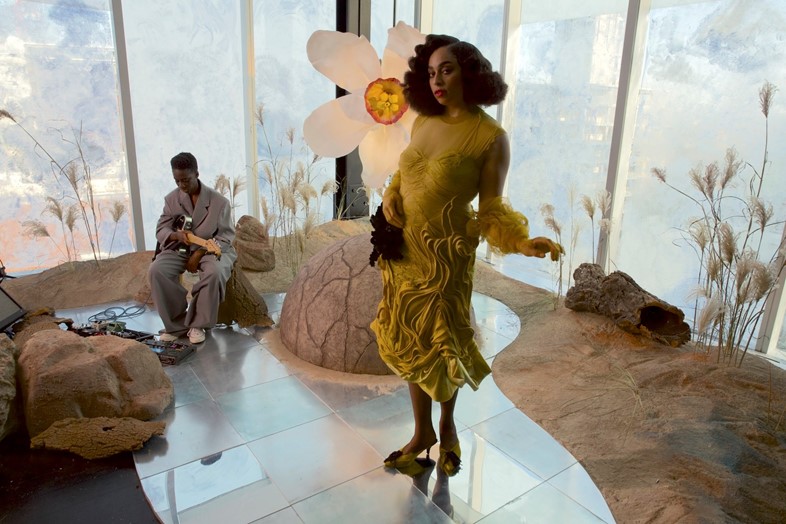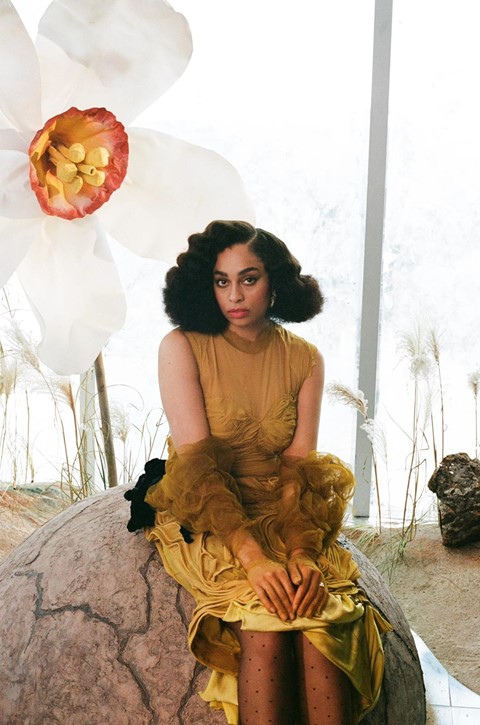As the singer teams up with the Tate Collective for a virtual gig, she opens up to Sagal Mohammed about her new sense of purpose and navigating the fickle nature of the music industry
In a world where Tik Tok-worthy pop tunes dictate the music industry, soulful genres prioritising poignant storytelling over commercialised rhythms with clever beat drops are often neglected in the mainstream. Celeste Epiphany Waite is changing that. The British-Jamaican jazz artist mesmerised the nation at the 2020 Brit Awards, where she received the annual Rising Star accolade before giving a performance so divine, it left the audience in silent awe.
This moment slingshot the 27-year-old singer-songwriter to fame, with people hailing her the generational voice of modern jazz. But shortly after, her success was stalled when the pandemic brought the world to a standstill. Live shows and entertainment events were put on ice and frenetic schedules were suddenly cleared with no return to ’normality’ in sight. The experience brought a life-changing sense of clarity for Celeste, who cancelled out the noise of record label expectations and pressures to compromise her authenticity for music that ’sells’, to hone in on her purpose – a decision that has led to the biggest year of her life.
In March, she received her first Oscar nomination for soundtracking Netflix’s acclaimed feature film The Trial of the Chicago 7 with the healing Hear My Voice. The following month, she performed the track at the prestigious award show and at the BAFTAs, shortly after proclaiming that Love Is Back with a stunning US debut on The Tonight Show Starring Jimmy Fallon. Now, Celeste has teamed up with the Tate Collective for Tate Reframed, a series of virtual gigs in specially designed sets inspired by iconic artworks from the gallery’s collection. Here, she tells AnOther about her painting of choice, her new sense of purpose and navigating the fickle nature of the music industry, as well as reflecting on her biggest career highs ...
Sagal Mohammed: Tell me about the painting that you selected for your performance. What was it about Salvador Dalí’s Metamorphosis of Narcissus that resonated with you?
Celeste Epiphany Waite: What I love about the painting is that it’s all about blossom and bloom, and the birth of new life. The song that I sang for the performance, Not Your Muse, correlates quite well with that. I wrote it at a turning point [in my life] when all of a sudden I started to find my strengths again and learnt how to stand my ground as a woman in the music industry. That song was me blossoming into that and telling people that I’m not here to be molded and manipulated. I am who I am and I’m not something you can change for your own purpose. That’s how I saw it all come together in my mind.
SM: We’ve recently come out of lockdown but what has life been like for you as a performer during the pandemic?
CEW: It allowed me to slow down for a minute and take stock of what’s been going on and what I want out of my career. But I’ve also missed playing shows, travelling and meeting new people. It kind of feels like the most rewarding parts of being a musician have been stripped away in the last year. I’m missing out on certain feelings like confidence and all the other little things that come when you’re socialising and acclimatising to a new country.

SM: It has already been an amazing year for you. Not only were you nominated for an Oscar but you performed both there and at the Baftas. How does it feel being back in these spaces?
CEW: I definitely had a new mindset coming back into it all. I’ve been looking at the world and what’s happened to a lot of people this year, all the suffering ... It made me think about what’s important in the music industry. I tried to figure out how I could find meaning or purpose in something that sometimes feels a bit superficial, remembering why I made music in the first place. When I was younger, I had so many crazy thoughts and so much anxiety. I had to put my energy into something that I could focus on instead of feeling all my pain. Music can be so soothing and medicinal. It can soundtrack certain moments in people’s lives. That’s what I want to do, that’s what I’ve always wanted to do, with my music. But if I’m going to do that, I have to make sure everything I write now in the next year has real meaning to it and never compromise my integrity to please people. I’m grateful for the times we’ve been through in the past year for helping me stand firm in that.
SM: Your song Hear My Voice is the soundtrack to The Trial of the Chicago 7, which earned you the Oscar nomination. How did that collaboration come about?
CEW: Daniel Pemberton, who had just started working on the score for the film, contacted me last year. I didn’t really know much about him or how legitimate it was at the time because I had never really done anything with films before, but I thought why not? I always say yes to something unless I absolutely hate the idea because you ever know where these things will lead. In this case, it led to an Oscar nomination. I haven’t really felt the full effects of what it is like to be an Oscar-nominated writer yet. I’m still living in my flat down the alleyway in Kensal Rise. I’m not out in Hollywood getting my teeth whitened yet.
SM: You’ve achieved so much since winning the Rising Star Award at the Brits. What has been the highlight for you so far?
CEW: Many things feel superficial looking back but I really did feel proud to sing on Jools Holland for the first time, which was now a really long time ago, back in 2019. Being in this position overall is just a highlight for me. It’s still quite surreal to think that I had an idea of something that I wanted to do, pursued it and now it has become my actual reality.
SM: What’s the most surprising thing you’ve experienced in your career so far?
CEW: I think I was just naive in a way when I first got into the industry. I always heard that it was going to be tricky and all the usual things people tell you about the music industry but, as each year passed, I learnt so much and realised how naive I had been the year prior. You can’t underestimate how cutthroat this space really is. You make bonds with people because it is a professional job but so much of it is also a personal relationships kind of job. So you make friends with a lot of people but then it’s tough when things don’t go to plan and those people then aren’t there because they’re not actually your real people. That’s a tough reality. I remember my manager saying to me very clearly once, “It’s a business relationship and don’t forget that.” I’ve now learnt that in some tough ways so I’m not going to forget it.
SM: You’re a songwriter as well as a singer. What inspires you the most when putting pen to paper?
CEW: For me, music is such a fundamental part of having a voice in society. Whenever there’s been a group of people in society that have been marginalised or had prejudice against them, they have used music to express their experience in a way that people can understand without feeling like they’re having loads of information shoved in their face at once. You listen to a song and before you know it, you’ve heard a political message or you’ve heard someone’s story who you might never have heard of before.
SM: Who would you call your musical heroes?
CEW: When I first decided I wanted to do music I was completely obsessed with Etta James and Aretha Franklin. Then I discovered this guy called Willis Earl Beal who really inspired me. He only had one song at the time called Evening’s Kiss but it drove me mad because I just thought they were the best lyrics I’d ever heard. That was one of the songs that made me want to write music. He made me realise how poetic it could be but also how much of a true physical representation of life you could reflect in a song. There’s one lyric where he says: “Got me counting my dime so on the bus I can ride.” I just think that stuff is the epitome of what real music is about. You can see that lyric in your life.
SM: What’s next on the agenda for you? Do you have any specific goals for the future?
CEW: Well, there are so many things I want to achieve in terms of self-development. I really want to find my confidence again. Not false confidence, but real strength in person and character. I’ve always thought I was a really confident person but all of a sudden, certain things that have gone a bit rickety in my life have had me freaking out a little. So my goal is to find a steady and sturdy place. I cut my hair recently. I feel like people do that when they’re having a mental breakdown but for me cutting my hair was so important because I just didn’t feel like myself anymore with that big, long afro – I felt like an animation. It was almost like a costume that I put on every time I performed or took a photo. It wasn’t what I was looking like when I was at home and I really wanted to connect those two identities because it felt healthier.
